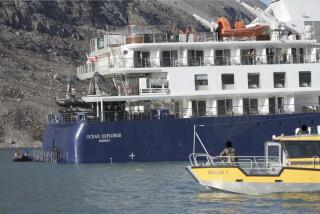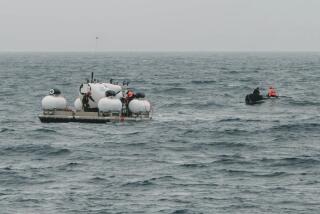Column: The cruise ship industry is sinking. I’m OK with that
Miami-based Norwegian Cruise Line, one of the biggest cruise ship operators, warned this week that the company could go out of business as a result of the COVID-19 pandemic.
See you, fellas.
If we’ve learned nothing else from the coronavirus catastrophe, it’s that cruise ships are a breeding ground for nasty, potentially lethal little germs — and that the vessels are perfectly positioned to transport those germs around the world.
Moreover, this industry has made plain it cares little for customers’ loyalty, in many cases denying refunds for canceled trips and instead offering credit for upcoming cruises. Which is to say, a chance to be sickened at a future date.
Sam Davis, professor emeritus of architecture at UC Berkeley, has gone on a couple of cruises with his wife, Joanne. They enjoyed it a lot — the dressing up, the dancing, the luxury and convenience.
Now they’re battling with Crystal Cruises over a refund for the $30,000 they paid for a two-week Asian voyage that had been scheduled to set sail in March.
The trip was canceled because of the pandemic. Davis said Crystal offered him a credit for a future cruise between now and 2022.
He’s 74. His wife is 70. Davis told me it’s “very unlikely” they’ll risk their health on another trip with any cruise line.
“We truly enjoyed our previous cruises,” he said. “But it doesn’t seem worth it any longer.”
There it is. The cruise industry is offering a service that’s clearly attractive to some. But it also represents a possibly grave threat to its customers’ well-being.
That’s a trade-off I suspect many folk — especially seniors — will no longer find acceptable.
“All life is a risk of some sort,” Davis observed. “When you’re crossing the street, you’re taking a risk.”
When it comes to cruises, however, “that seems like too big a risk,” he said.
I’ve heard the same from others.
Mission Viejo resident Lawrence Light, 84, told me he and his wife were booked on a Princess Cruises excursion to Alaska this month. They paid about $10,000 for the trip.
After the voyage was canceled, Light said, Princess offered a credit for a future cruise. He said no thanks and asked for a full refund.
Princess, laudably, agreed to give back Light’s payment. He said the company pledged to return the funds within 10 days.
That was a couple of months ago. Light said he’s now being told he won’t see his money until June at the earliest.
“And I have my doubts,” he said. “What if they go bankrupt?”
That’s a very real possibility for all cruise lines, which, along with airlines and hotels, have been among the hardest-hit industries since the pandemic began terrorizing the planet.
In a filing this week with the Securities and Exchange Commission, Norwegian said a “voluntary suspension” of all its cruises through June 30 is having a blistering effect on the company’s finances.
With around $6 billion in long-term debt obligations, Norwegian said, there’s “substantial doubt about the company’s ability to continue as a going concern.”
If things don’t turn around, it continued, “it may be necessary for us to reorganize our company in its entirety, including through bankruptcy proceedings.”
Norwegian also runs Oceania Cruises and Regent Seven Seas Cruises.
The company noted in its filing that “actual or perceived risk of infection” on its ships “could have an adverse effect on the public’s perception of the company, which could harm our reputation and business.”
In fact, there’s no longer any question about a risk of infection aboard cruise ships. Before the coronavirus, one of the biggest threats to passengers was norovirus, which was reported among travelers on numerous vessels.
According to the Centers for Disease Control and Prevention, nearly 130,000 cruise passengers were sickened by norovirus from 2008 to 2014.
That’s a relatively small percentage of the millions of people who traveled aboard cruise ships during the period. But if you were among the tens of thousands who suffered the nausea, vomiting and cramps of the typical norovirus, this is slight consolation.
The current coronavirus is highly contagious and more deadly than past norovirus strains, so, if anything, the perception of cruise ships as floating petri dishes is even more apt.
President Trump has pledged to “work very hard” to bail out beleaguered cruise lines. However, these companies have gone out of their way to be undeserving of taxpayer support.
As I’ve pointed out previously, most major cruise operators are incorporated outside the United States and don’t pay federal income taxes.
Norwegian, for example, may be based in Miami like other cruise lines, but it’s incorporated in Bermuda. Most of its ships fly the flag of the Bahamas.
Foreign flags allow cruise ships to skirt stricter U.S. regulations, including safety rules, and to take advantage of home ports’ more advantageous tax benefits.
The $2-trillion aid package signed into law in March limits financial assistance to U.S.-incorporated companies, so cruise lines were left to fend for themselves.
Some lawmakers have argued that any bailout cash should be contingent on cruise lines reincorporating in the United States and flying American flags. That makes sense.
But the larger issue, which Norwegian touched on in its filing, is the public’s growing perception of cruise ships as a fast track to sickness.
It should be obvious to all that you’re taking an enormous gamble as soon as you step aboard.
Jeffrey Barnett, 52, has taken his family on half a dozen cruises. They were booked to set sail with Carnival next month for a weeklong trip to the Caribbean.
The Austin, Texas, resident said he’s been told by the cruise line it will refund his $5,000 for the canceled voyage. After that, he’ll wait to see what measures Carnival puts in place to mitigate the danger of infection.
Will there be fewer passengers? Empty rooms separating guests? Mandatory masks and social distancing?
“I can’t tell you we’re gonna take another cruise,” Barnett said. “But I’m not saying we won’t.”
He knows this much, though: “I’m not keen to put my family at risk.”
If the cruise industry has a future, it’s going to have to convince Barnett and others it can handle such concerns.
It has a lot of work to do.







